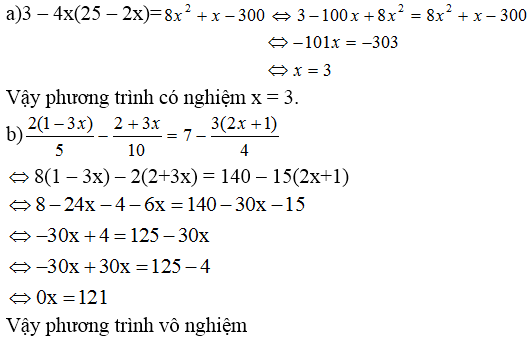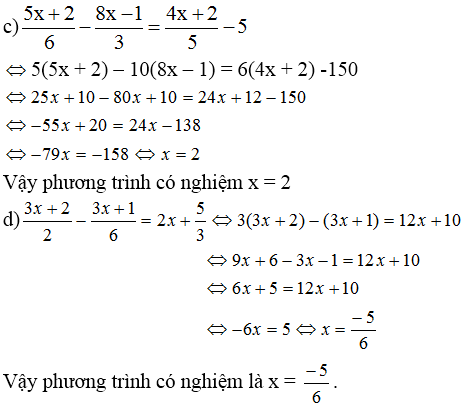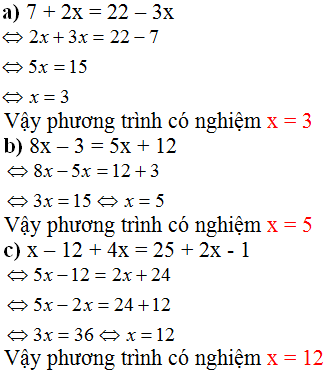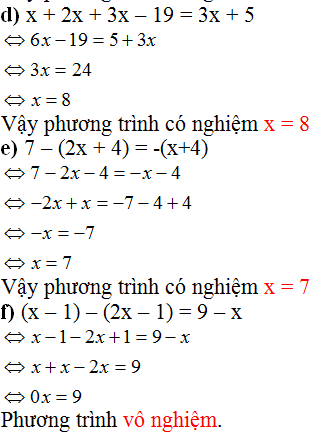
Hãy nhập câu hỏi của bạn vào đây, nếu là tài khoản VIP, bạn sẽ được ưu tiên trả lời.


b/ \(3-100x+8x^2=8x^2+x-300\)
\(\Leftrightarrow-101x=-303\)
\(\Rightarrow x=3\)
c/ \(5\left(5x+2\right)-10\left(8x-1\right)=6\left(4x+2\right)-150\)
\(\Leftrightarrow25x+10-80x+10=24x+12-150\)
\(\Leftrightarrow-79x=-158\)
\(\Rightarrow x=2\)
d/ \(3\left(3x+2\right)-\left(3x+1\right)=12x+10\)
\(\Leftrightarrow9x+6-3x-1=12x+10\)
\(\Leftrightarrow-6x=5\)
\(\Rightarrow x=-\frac{5}{6}\)
e/ \(30x-6\left(2x-5\right)+5\left(x+8\right)=210+10\left(x-1\right)\)
\(\Leftrightarrow30x-12x+30+5x+40=210+10x-10\)
\(\Leftrightarrow13x=130\)
\(\Rightarrow x=10\)
\(A=x^2-4x+1=\left(x-2\right)^2-3\ge-3\)
\(\Rightarrow A_{min}=-3\) khi \(x=2\)
\(B=4x^2+4x+11=\left(2x+1\right)^2+10\ge10\)
\(\Rightarrow B_{min}=10\) khi \(x=-\frac{1}{2}\)
\(C=\left(x-1\right)\left(x+6\right)\left(x+2\right)\left(x+3\right)=\left(x^2+5x-6\right)\left(x^2+5x+6\right)\)
\(=\left(x^2+5x\right)^2-36\ge-36\)
\(\Rightarrow C_{min}=-36\) khi \(\left[{}\begin{matrix}x=0\\x=-5\end{matrix}\right.\)
\(D=-x^2-8x-16+21=21-\left(x+4\right)^2\le21\)
\(\Rightarrow C_{max}=21\) khi \(x=-4\)
\(E=-x^2+4x-4+5=5-\left(x-2\right)^2\le5\)
\(\Rightarrow E_{max}=5\) khi \(x=2\)

a, (2x+5)mũ 2=(x+2) mũ 2
=.> (2x+5) mũ 2-(x+2) mũ 2=0
=> (2x+5+x+2)x(2x+5-x-2)=0
=>(3x+7)x(x+3)=0
=>3x+7=0 hoặc x+3=0
3x+7=0=>x=-7/3
x+3=0 =>x=-3
vậy x=-7/3 hoặc x=-3
hok tot

(x2 + x + 1)(6 - 2x) = 0
<=> 6 - 2x = 0 (do x2 + x + 1 > 0)
<=> 2x = 6
<=> x = 3
Vậy S = {3}
(8x - 4)(x2 + 2x + 2) = 0
<=> 8x - 4 = 0 (vì x2 + 2x + 2 > 0)
<=> 8x = 4
<=> x = 1/2
Vậy S = {1/2}
x3 - 7x + 6 = 0
<=> x3 - x - 6x + 6 = 0
<=> x(x2 - 1) - 6(x - 1) = 0
<=> x(x - 1)(x + 1) - 6(x - 1) = 0
<=> (x2 + x - 6)(x - 1) = 0
<=> (x2 + 3x - 2x - 6)(x - 1) = 0
<=> (x + 3)(x - 2)(x - 1) = 0
<=> x + 3 = 0
hoặc x - 2 = 0
hoặc x - 1 = 0
<=> x = -3
hoặc x = 2
hoặc x = 1
Vậy S = {-3; 1; 2}
x5 - 5x3 + 4x = 0
<=> x(x4 - 5x2 + 4) = 0
<=> x(x4 - x2 - 4x2 + 4) = 0
<=> x[x2(x2 - 1) - 4(x2 - 1)] = 0
<=> x(x - 2)(x + 2)(x - 1)(x + 1) = 0
<=> x = 0 hoặc x - 2 = 0 hoặc x + 2 = 0 hoặc x - 1 = 0 hoặc x + 1 = 0
<=> x = 0 hoặc x = 2 hoặc x = -2 hoặc x = 1 hoặc x = -1
Vậy S = {-2; -1; 0; 1; 2}
+ Ta có: \(\left(x^2+x+1\right).\left(6-2x\right)=0\)
- Ta lại có: \(x^2+x+1=\left(x^2+x+\frac{1}{4}\right)+\frac{3}{4}=\left(x+\frac{1}{2}\right)^2+\frac{3}{4}\ge\frac{3}{4}>0\forall x\)
- Vì \(x^2+x+1>0\forall x\)mà \(\left(x^2+x+1\right).\left(6-2x\right)=0\)
\(\Rightarrow6-2x=0\Leftrightarrow-2x=-6\Leftrightarrow x=3\left(TM\right)\)
Vậy \(S=\left\{3\right\}\)
+ Ta có: \(\left(8x-4\right).\left(x^2+2x+2\right)=0\)
- Ta lại có: \(x^2+2x+2=\left(x^2+2x+1\right)+1=\left(x+1\right)^2+1\ge1>0\forall x\)
- Vì \(x^2+2x+2>0\forall x\)mà \(\left(8x-4\right).\left(x^2+2x+2\right)=0\)
\(\Rightarrow8x-4=0\Leftrightarrow8x=4\Leftrightarrow x=\frac{1}{2}\left(TM\right)\)
Vậy \(S=\left\{\frac{1}{2}\right\}\)
+ Ta có: \(x^3-7x+6=0\)
\(\Leftrightarrow\left(x^3-x^2\right)+\left(x^2-x\right)+\left(6x-6\right)=0\)
\(\Leftrightarrow\left(x-1\right).\left(x^2+x-6\right)=0\)
\(\Leftrightarrow\left(x-1\right).\left[\left(x^2-2x\right)+\left(3x-6\right)\right]=0\)
\(\Leftrightarrow\left(x-1\right).\left(x-2\right).\left(x+3\right)=0\)
Vậy \(S=\left\{-3;1;2\right\}\)
+ Ta có: \(x^5-5x^3+4x=0\)
\(\Leftrightarrow x.\left[\left(x^4-x^2\right)-\left(4x^2-4\right)\right]=0\)
\(\Leftrightarrow x.\left[x^2.\left(x^2-1\right)-4.\left(x^2-1\right)\right]=0\)
\(\Leftrightarrow x.\left(x^2-1\right).\left(x^2-4\right)=0\)
\(\Leftrightarrow x=0\left(TM\right)\)
hoặc \(x^2-1=0\Leftrightarrow x^2=1\Leftrightarrow x=\pm1\left(TM\right)\)
hoặc \(x^2-4=0\Leftrightarrow x^2=4\Leftrightarrow x=\pm2\left(TM\right)\)
Vậy \(S=\left\{-2;-1;0;1;2\right\}\)
!!@@# ^_^ Chúc bạn hok tốt ^_^#@@!!

\(2x^4+3x^3+8x^2+6x+5=0\)
\(\Leftrightarrow2x^4+2x^3+2x^2+x^3+x^2+x+5x^2+5x+5=0\)
\(\Leftrightarrow2x^2\left(x^2+x+1\right)+x\left(x^2+x+1\right)+5\left(x^2+x+1\right)=0\)
\(\Leftrightarrow\left(x^2+x+1\right)\left(2x^2+x+5\right)=0\)
Mà \(x^2+x+1=\left(x+\frac{1}{2}\right)^2+\frac{3}{4}>0\forall x\)
\(2x^2+x+5=2\left[\left(x+\frac{1}{4}\right)^2+\frac{39}{16}\right]>0\forall x\)
Vậy tập nghiệm của pt là \(S=\varnothing\)
b, \(\frac{x-342}{15}+\frac{x-323}{17}+\frac{x-300}{19}+\frac{x-273}{21}=10\)
\(\Leftrightarrow\left(\frac{x-342}{15}-1\right)+\left(\frac{x-323}{17}-2\right)+\left(\frac{x-300}{19}-3\right)+\left(\frac{x-273}{21}-4\right)=0\)
\(\Leftrightarrow\frac{x-357}{15}+\frac{x-357}{17}+\frac{x-357}{19}+\frac{x-357}{21}=0\)
\(\Leftrightarrow\left(x-357\right)\left(\frac{1}{15}+\frac{1}{17}+\frac{1}{19}+\frac{1}{21}\right)=0\)
\(\Leftrightarrow x-357=0\Leftrightarrow x=357\)
Vậy tập nghiệm của pt: \(S=\left\{357\right\}\)




3 – 4x(25 – 2x) = 8x2 + x – 300
⇔ 3 – 4x.25 + 4x.2x = 8x2 + x – 300
⇔ 3 – 100x + 8x2 = 8x2 + x – 300
⇔ -100x – x = -300 – 3
⇔ -101x = -303
⇔ x = 3.
Vậy phương trình có tập nghiệm S = {3}.